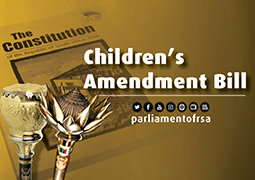
The lack of funding for non-governmental organisations (NGOs) that protect the rights of children is a huge impediment to their work. So said participants during the first leg of public hearings into Children’s Amendment Bill in Kimberley, in the Northern Cape.
“While I support the Bill, I have one major problem. NGOs have applied for certification by the Department of Social Development, but they don’t get any funding, which leaves us at a disadvantage. How are we supposed to implement our programmes when we don’t have any resources and support?” asked Ms Dikeledi Frans. She has been told that reason given by the department to explain the lack of funding is that their programmes are cross-cutting and lie within various other government departments.
Participants at the hearings also mentioned that it seems to them that NGOs in urban areas are funded while those in rural areas are not. The lack of funding, they said, is a direct contradiction to section 35 of the Amendment Bill, which compels MECs to prioritise the funding of NGOs. “We hope that the passing of this Bill will ensure that funding is released to NGOs like mine to enhance the protection of the rights of children,” Ms Frans emphasised.
There was also a call for the Bill to regularise and expedite the foster care application process, as the current process is cumbersome and lengthy. Participants supporting this view emphasised that the current process presented problems for the poor and that it impedes the ability to apply for the foster child grant, which is essential in proving for the child.
Participants were also critical of the worrying trend of alcohol and substance abuse among children within the community. “Today children have easy access to alcohol. Here in Galeshewe, there is a park where on a daily basis you find children drinking alcohol, which speeds up social disintegration. This Bill needs to address the issue of shebeens enabling access to alcohol by children,” said Mr Brody Moth from the African Christian Democratic Party.
Mr Moth was also critical of shebeens in close proximity to schools, as this disrupts the environment necessary to encourage teaching and learning.
Regarding the rights of unmarried fathers, the view was that the Bill must be enhanced to compel fathers to care and keep contact with their children beyond the standard financial maintenance of the child by the parent. “A child doesn’t know the value of money and requires a sense of belonging. The lack of contact and care by both parents have long-lasting impact on the child. We do not have a policy that compels a biological father to make contact with their children and this needs to change. While we have a law that compels parents to support the child, there is nothing that compels the father to be in contact with the child,” said participant Ms Nosipho Phungwayo.
Following the hearings, Members of Parliament in the committee called for a collaborative effort to ensure that children’s rights are protected. They called on the community to link up with the authorities when they observe that these rights are being infringed.
The committee continues with public hearings in the Northern Cape with a session in Mothibistad.
Malatswa Molepo
9 November 2021

